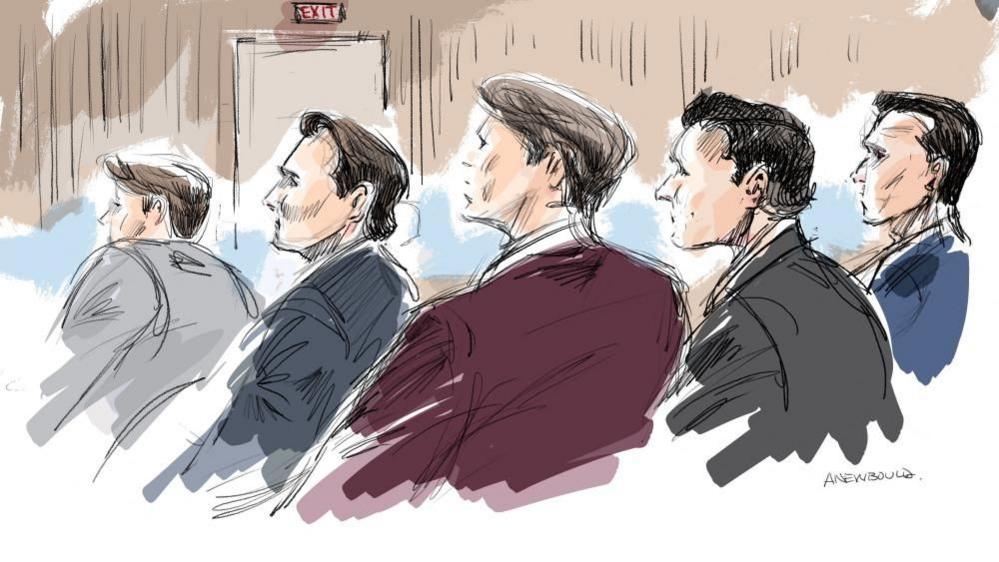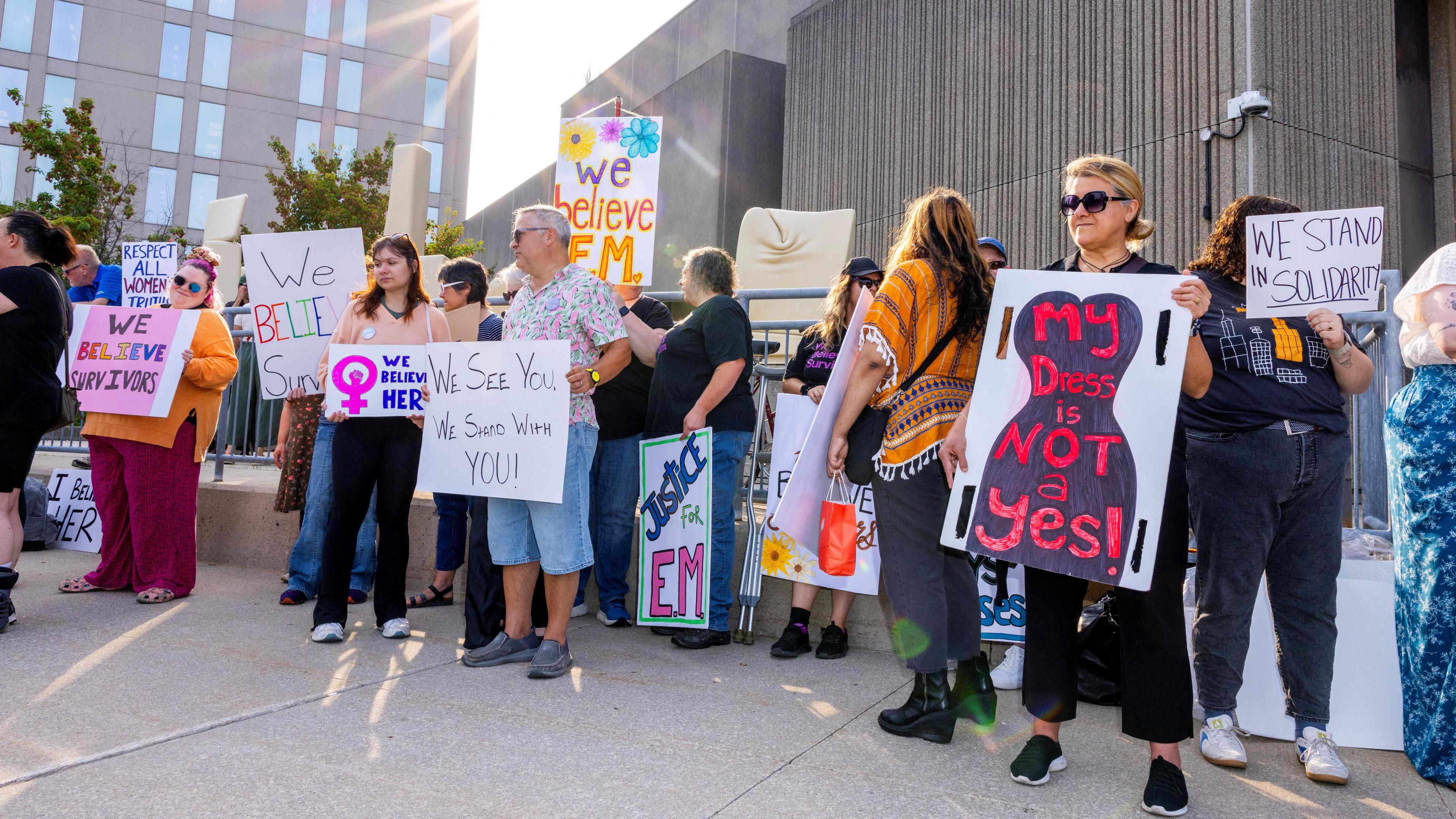Five ice hockey players found not guilty in Canada sexual assault case

From left to right: Michael McLeod, Alex Formenton, Carter Hart, Dillon Dube, Cal Foote
- Published
Five Canadian ice hockey players accused of sexually assaulting a woman have all been acquitted by an Ontario judge in a case that has been closely watched in Canada.
In a packed courtroom on Thursday, Justice Maria Carroccia reviewed testimony and evidence from the eight-week trial over several hours before declaring the men not guilty.
The former players for Canada's world junior hockey team were accused of assaulting the woman, known as EM, in a hotel room in 2018 in London, Ontario, where they had been attending a Hockey Canada gala.
Justice Carroccia said she did not find EM's evidence "credible or reliable", and that "the Crown cannot meet its onus on any of the counts".
The players are Michael McLeod, Dillon Dube, Cal Foote, Alex Formenton and Carter Hart, and all were with the National Hockey League (NHL) when the allegations surfaced, although one was playing in Europe.
In a statement on Thursday, the league said they remain "ineligible" to playin the NHL pending a review of the judge's findings.
The players declined to speak to the media after the decision and their lawyers each offered statements on their behalf.
Lawyer David Humphrey, who represented Mr McLeod, said that his client is relieved.
"For years, public perception was shaped by a one-sided narrative", Mr Humphrey said, adding that the damage to Mr McLeod's career and reputation "has been significant".
Lawyer Karen Bellehumeur, speaking on EM's behalf, said the woman had tuned in to Thursday's hearing virtually and was "very disappointed" with the judge's assessment of her credibility.
"When a person summons the courage to disclose their story, the worst possible outcome is to feel disbelieved," said Ms Bellehumeur.
The central issue of the trial was whether EM, who was 20 at the time of the incident, had consented to every sexual act in the hotel room that night.
Court heard that the woman had met the players at a bar and later went back to the hotel room to have consensual sex with Mr McLeod. Other players then entered the room and engaged in further sexual acts with her.
Lawyers for the players contended that she asked the men to have sex with her and they believed she gave consent.
EM, however, testified that she was intoxicated and felt fearful of the men. While she had initially agreed to have sex with Mr McLeod, she testified that she did not agree to what unfolded afterwards.
Only one player, Mr Hart, testified in his own defence.
The trial attracted significant attention in Canada. Many people had attended court to hear the ruling on Thursday, forcing clerks to open two additional overflow rooms.
Some of the players appeared visibly relieved in Thursday's hearing after Justice Carroccia revealed that she was not convinced with EM's testimony.

In explaining her ruling, Justice Carroccia pointed to irregularities in EM's testimony, including about who had bought drinks that night, and said her statements reflected an "uncertain memory" that did not line up with evidence presented in the trial.
The judge added that there were differences in what the woman told police investigators and those for Hockey Canada, which settled a C$3.5m ($2.5m; £1.9m) lawsuit with her for an undisclosed sum in 2022.
Two videos from the incident were shared in the trial, where EM was recorded giving her consent to the activities. The first was taken without her knowledge.
While under Canadian law the videos did not establish consent, the judge said they did show EM "speaking normally, smiling", and that she "did not appear to be in distress".
That undercut the Crown's argument that EM did not leave the room out of fear, she said.
It is unclear if the Crown will appeal. Prosecutor Meaghan Cunningham said her team will carefully review the decision.
She added they had received "dozens of messages from people across Canada and abroad" expressing support for EM.
"A successful prosecution is not measured solely by whether there are guilty verdicts at the end," she said. "The Crown's goal throughout this proceeding has been to see a fair trial, a trial that is fair to the men charged, and one that is also fair to EM."
Throughout the trial, the Crown argued the woman's testimony was credible, that "intoxication does not equal unreliability" and that any inconsistencies in her testimony were minor.
They also argued the woman did not have a motive to fabricate a story and that she had initially reported the alleged assault to police in 2018, four years before filing the lawsuit against Hockey Canada.
They added that text messages between the players allegedly showed it was Mr McLeod's idea to invite his teammates to the room and that the players allegedly engaged in "getting their story straight" by drafting a narrative that EM had consented to all sexual activity.
Justice Carroccia dismissed that argument, saying the players were "recounting their recollections" of what unfolded.

Defence lawyers argued that EM's testimony was undermined by eyewitness testimony from two players who were present in the room but not charged in connection with the incident.
Both had told the court that the woman was "vocal" about what she wanted sexually.
Lawyers for the players also argued that the woman was a willing participant who later felt regret, and that intoxication in this case did not equal "incapacity".
Several protestors in support of EM had gathered outside the courthouse throughout the trial and on verdict day.
One of them, Fabienne Haller, told the BBC she felt "devastated" with the outcome.
She added that she believed the case "will influence the next decade, and even more, of how sexual assault cases are going to be dealt with" in Canada.